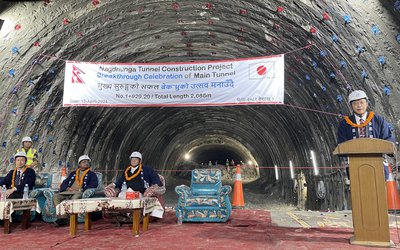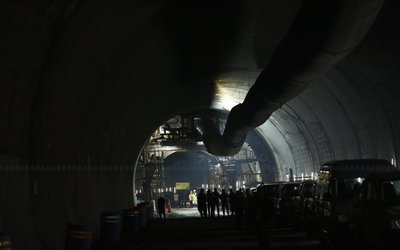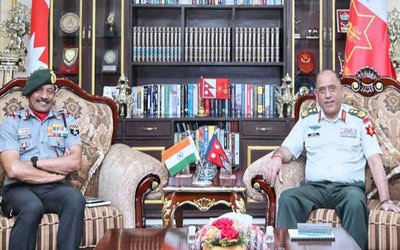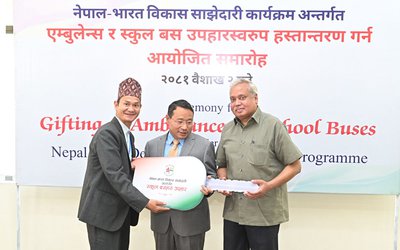Rameshwor K.C. (not a real name) has been collecting the parking toll in one of the busiest locations in New Road. When he was hired by a contractor nine years ago, he was asked to pay Rs.1000.00 a day. Then the hourly parking charge of a motorbike was Rs. 5 and of a car Rs.10 then. Now K.C. is paying Rs.10,000.00 a day in a slot of three hundred meters of the road lane.
Whatever the change in the amount of charge paid by petty contractors like K.C. in a decade, the annual income to Kathmandu Metropolitan Corporation has not jumped as much. For the past several years, the revenue generated from parking remains at around Rs.10-15 million annually. According to the website of GTZ/UDLE, the revenue has remained stagnant.
KMC allocated 35 locations for the parking of various vehicles. It generated Rs. 15.4 million last year from the parking and this year it is expecting to increase the annual income to up to Rs. 20 million.
Although KMC records showed that the land is allocated in 35 venues, Traffic Police has recorded that more than 100 public places are used as parking lots.
Rush of the Vehicles
Vehicles entering Kathmandu roads have grown thirteen times between 1989-90 and 2009-10. Some 1.01 million vehicles ply on these roads currently. However, the real growth has been seen in the last two years with 102,570 vehicle registrations in the fiscal year 2008-09 and 201,787 last year. According to the Department of Transport Management (DoTM), until 1989-90 only 78,378 vehicles were on the roads, comprising bus (4,159), car, jeep and van (24,050) and motorcycle (35,776).
Their current number is 2,028 and 6,681, respectively. Of 1.01 million vehicles plying on the roads, motorcycles cover 63.67 per cent, that is 744,727 motorcycles, in the country, followed by 113,391 cars, jeeps and vans, 56,827 tractors, 45,961 trucks and heavy vehicles, and 23,243 buses.
Around 168,707 motorcycles were added to the list in 2009-10, followed by cars, jeeps, vans, microbuses (14,388), tractor/power tailor (11,460) bus, minibus, truck (5,857) and heavy vehicles (1,335). Only nine tempo and 31 other vehicles entered the Nepali roads during the period.
With a total population of over 5 million, Kathmandu metropolitan city is by far the largest urban agglomerate in Nepal, accounting for 20% of the urban population in an area of 5,067 hectares, or 50.67 square kilometers.
According to the Department of Transport Management (DoTM), in the last five years (2006-10), the number of vehicles registered in the Bagmati zone reached 249,219—more than half of all the vehicles registered in the country.
The more the vehicles, the more the place needed for parking.
“Traffic management should be systematic. Drivers should park vehicles in their right places and the traffic police should manage the situation better,” Suraj Sigdel, senior divisional engineer at the DoR, said.
Department of Roads complains about the traffic police’s inability to allocate parking lots on the Ring Road even after two months of the declaration of the road as a no-parking zone. This has made driving a difficult job for city folks.
The rush in the execution of the concept of alternative parking—which the Metropolitan Traffic Police Division (MTPD) promised earlier—has led to flouted of rules.
“Other managerial works like designating parking spaces are the responsibility of the KMC,” officials said.
Dhanpati Sapkota, chief of the implementation department of the KMC, said studies were going on to fix the parking spaces.
“We are doing homework to find fixed parking spots as the ongoing mission is successful and traffic woes in the Valley have also eased to some extent,” he said.
According to Sapkota, the KMC is also trying to coordinate with the MTPD for suggesting parking spaces. Due to deteriorating law and order situation and weak monitoring mechanism, Metropolitan officials too are helpless to stop such acts as many local clubs with the backing of major political parties are now generating income. For instance, Shankata Sports Club and RCT Clubs collect parking charges from parking lots of Nepal Airlines, Tempo Park and Ranipokhari corner. Legalized by ward offices, local clubs control the resources. Ward offices are helpless spectators in the process as they cannot resist the pressure of leaders of local political parties who have influences going up to the center and the Ministry.
Nepali Congress leader Dhyan Govinda Ranjit, who is also a member of an all-party mechanism, rejected that politicians press anybody to do this or that.
“We have never pressurised any KMC official to do this or that,” said Ranjit.
Pay Parking
Pay parking system began in 1994 when the municipality was under Nepali Congress. In the initial phase, the tender was awarded to one contractor which paid the money to the municipality. However, this process changed later. Had the contract been awarded to one party, it would have generated huge resources and the process would have been transparent.
As the big contractors are barred, the duty of collection of parking money has been awarded to local level contractors. In awarding tenders to petty contractors, there is a possibility of nepotism and favoritism. Under the current system to hire petty contractors, politicians and municipal officials can manipulate the process at their wish. The trends to hand over the parking revenue generation to ward office will turn the deal more vulnerable to corruption.
This is the reason the tender is unofficially traded at several levels. The person or firm who officially gets the contract award sells it to other persons for a hefty money.
This is the reason Metropolitan officials and political leaders start lobby in favor of certain contractors months before the time of retender.
Jagat Shrestha (name changed), a collector in Durbarmarg, has worked under four different contractors in the last six years.
“The contractors divide the areas among various boys on the basis of the sub-contract,” said Shrestha.
“ I have to pay Rs. 3000.000 a day for the four hundred meters of road side. We don’t know anything about the top level dealing.”
Kathmandu Metropolitan Corporation collected about Rs. 2630,709.00 pay parking till Chaitra 30. In the month of Chaitra, the Municipality collected 172,245.00. According to revenue officer Ram Prasad Paudel, the tenders are called by ward offices and center. With the partnership with ward office, social clubs are also generating money by declaring certain public place as parking zones.
“ I get the tender through the open bidding process. I took part in the open bidding process and my proposal was selected on the basis of amount I agreed to pay,” said Binod Kumar Shakya, who is running the parking in Pako, Photo Concern, Ranamuketshwor, and R.B. Complex. His contract was awarded by ward no 22 of Kathmandu Metropolitan.
Shakaya is not colleting the money and he depends upon local boys who collect the money under the petty contract agreement with Shakya. “ We are asked to say that we are Shakya’s employees. That is not true. Actually I am paying Rs. 5000.000 a day in an area of 200 meters.
The scenario of fiscal discipline among the local bodies in Nepal has not been up to the mark. The effectiveness and transparency of the development grants the local bodies receive annually have failed to be ascertained in the absence of elected people’s representatives. “Mismanagement, corruption and misallocation of resources are a common practice among the local bodies,” said a national vigilance report.
Since the dissolution of the local bodies in 2002, they are functioning without elected people’s leadership and are involved in corruption and misappropriation at a degree never seen before.
The political parties formed an all-party mechanism as a temporary arrangement to fill in the vacuum and carry on service delivery and development works. This existing political mechanism is not an elected body. As a result, it is not accountable and transparent to the people in whose name it allocates and spends resources worth billions of rupees annually.
Tender Process
The Metropolitan awards the tender through the Public Procurement Act and Public Procurement Regulations. This is not applied in ward level where the ward secretary awards the tender under the influences. Out of 35 parking slots, 13 are allocated by Ward Offices.
“We are following the due process of law to hand over the parking contract. Our contract basically goes to those who bid on the highest amount of money,” said Ram Prasad Poudel, Tax Officer of Kathmandu Metropolitan.
Parking areas are declared by a committee comprising Traffic Police, Kathmandu Municipality and Department of Roads. This committee allocates the areas. Only after that, authority is given to municipality and wards to make necessary arrangements for parking.
In many places, the contractors who get awards sell their contracts to the second party and the second bidder hands it over to the third party and finally the job of collection of the money and managing parking lots goes to the local boys. There is a chain of bargaining and corruption.
The first bidder is responsible for the payment from the parking lot. In its name, in reality, the bidder is out of the scene once he or she gets the tender. They may be different individuals, groups and companies.
In a study released a few months ago, the NVC found that millions of rupees allocated to the Kathmandu Metropolitan City (KMC) had been grossly "misused" in the last 10 years. The National Vigilance Centre study revealed that a total of Rs. 124.5 million is still awaiting clearance from the respective recipients.
“A total of 46 employees were found to have taken advance payments ranging from Rs. 50,000 to 1,00,000, while 68 employees took between Rs. 100,000 to Rs. 467,500," the report mentions. Interestingly enough, the 17th Metropolis Council had decided to waive repayment by employees who took payments below Rs. 50,000.
"There is no accurate record of income and expenditure, and the financial irregularities have crossed the limit," the NVC report mentions.
The 22-page report further reveals that the KMC officials have not updated even the bank accounts or the name-list of employees who took the advances from the state coffers.
Out of one hundred parking lots, the Municipality has a list of 25 contractors. Nobody knows the remaining persons or clubs which are collecting money from several so called pay parking areas.
“ In many such areas, the Metropolitan just ignores the contractors knowing that political leaders have blessings on them. Political parties’ sister organizations, student unions of the colleges and other social organizations backed by political leaders are collecting the money illegally.
According to Metropolitan records, bidder Jaya Banglamukhi Suppliers was awarded the tender to levy parking charge in Babarmahal Tax office by the Municipality. Makhan Mahadev Club is awarded tender of parking in Makhan area by local ward office. Likewise, Jas Bahadur Gurung, with his address, mobile no. 9841179313, was awarded the tender of parking in Shanker Dev Campus, Bina Marg, Kamaladi east and west, Kathmandu Medical College Sinamangal Area, Rabi Bhavan and Kalanki. Nabin Poudel, mobile no. 9851036511, got the tender of parking in Dilli Bazar, Land Revenue Office, Naxal Bal Mandir, Baneshwor International Convention Center below Water Tank, the road to Kumari Hall and Saraswati Marg. Thamel Bikas Kosh was awarded at Thamel Provident Fund and local club was awarded the parking bid in Bagbazaar.
Out of 35 tenders, twenty tenders were awarded by the center and remaining by the wards. Although the bill is issued under these contractors’ name, the actual business is taken by other persons.
As all other municipalities in the country, Kathmandu Metropolitan is governed by employees and a group of nominated political workers having no accountability to the whole affairs. Thus, increase in the misuse of resources and irregularities in all kinds of financial dealings is common. Although it goes unnoticed, the misuse in parking charges is causing a loss of millions of rupees annually to the KMC coffer. Under the Local Self-Governance Act, 1999, Kathmandu Metropolitan is responsible for regulating the parking areas.
According to clause 144 LSGA 1999, the municipality may impose parking charge, as prescribed, at vehicles parking places and manage it.
Under the functions, duties and power of municipality relating to the works and transport, the clause 96 (f) (2)says the function and duties to be performed by Municipality mandatorily in the municipal areas shall be to arrange or cause to be arranged for bus parks, parking places of rickshaws, three wheelers, horse carts, trucks, buses and etc.
The KMC is just a representative case in the cycle of corruption and mismanagement that have spread roots in the local bodies in the absence of elected people’s representatives.
This is the 9th of nine investigative stories on politics of local bodies supported by The Asia Foundation. The views expressed by the Author do not necessarily reflect those of The Foundation of founder. Contractors Lists
Out of one hundred parking lots, the Municipality has a list of 25 contractors. Nobody knows the remaining persons or clubs which are collecting money from several so called pay parking areas.
“ In many such areas, the Metropolitan just ignores the contractors knowing that political leaders have blessings on them. Political parties’ sister organizations, student unions of the colleges and other social organizations backed by political leaders are collecting the money illegally.
According to Metropolitan records, bidder Jaya Banglamukhi Suppliers was awarded the tender to levy parking charge in Babarmahal Tax office by the Municipality. Makhan Mahadev Club is awarded tender of parking in Makhan area by local ward office. Likewise, Jas Bahadur Gurung, with his address, mobile no. 9841179313, was awarded the tender of parking in Shanker Dev Campus, Bina Marg, Kamaladi east and west, Kathmandu Medical College Sinamangal Area, Rabi Bhavan and Kalanki. Nabin Poudel, mobile no. 9851036511, got the tender of parking in Dilli Bazar, Land Revenue Office, Naxal Bal Mandir, Baneshwor International Convention Center below Water Tank, the road to Kumari Hall and Saraswati Marg. Thamel Bikas Kosh was awarded at Thamel Provident Fund and local club was awarded the parking bid in Bagbazaar.
Out of 35 tenders, twenty tenders were awarded by the center and remaining by the wards. Although the bill is issued under these contractors’ name, the actual business is taken by other persons.
As all other municipalities in the country, Kathmandu Metropolitan is governed by employees and a group of nominated political workers having no accountability to the whole affairs. Thus, increase in the misuse of resources and irregularities in all kinds of financial dealings is common. Although it goes unnoticed, the misuse in parking charges is causing a loss of millions of rupees annually to the KMC coffer. Under the Local Self-Governance Act, 1999, Kathmandu Metropolitan is responsible for regulating the parking areas.
According to clause 144 LSGA 1999, the municipality may impose parking charge, as prescribed, at vehicles parking places and manage it.
Under the functions, duties and power of municipality relating to the works and transport, the clause 96 (f) (2)says the function and duties to be performed by Municipality mandatorily in the municipal areas shall be to arrange or cause to be arranged for bus parks, parking places of rickshaws, three wheelers, horse carts, trucks, buses and etc.
The KMC is just a representative case in the cycle of corruption and mismanagement that have spread roots in the local bodies in the absence of elected people’s representatives.
This is the 9th of nine investigative stories on politics of local bodies supported by The Asia Foundation. The views expressed by the Author do not necessarily reflect those of The Foundation of founder.
- TANAHU HYDROPOWER PROEJCT: A Significant Achievement
- Apr 15, 2024
- AMBASSADOR HANAN GODAR: Sharing Pain With A Nepali Family
- Mar 30, 2024
- VISIT OF KfW AND EIB TO NEPAL : Mission Matters
- Mar 25, 2024
- NEPAL BRITAIN SOCIETY: Pratima Pande's Leadership
- Mar 24, 2024
- NEPAL ARMY DAY: Time To Recall Glory
- Mar 15, 2024
















